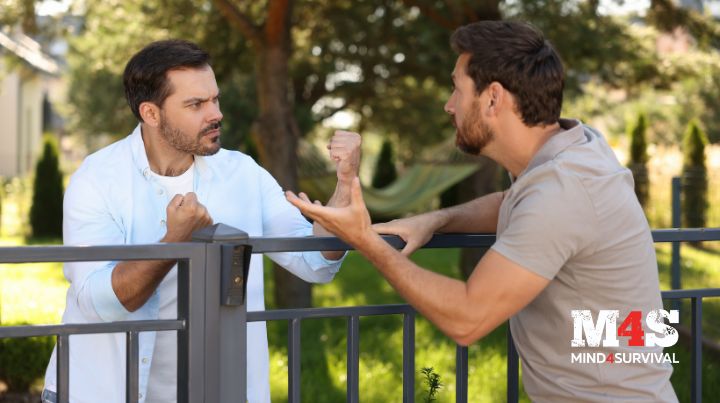At first blush, you might wonder why we’d be discussing interpersonal conflict resolution on a site devoted to preparedness and similar topics. Here’s the thing: I believe prepping isn’t just about end-of-the-world scenarios like EMP or WWIII. It’s a mindset that seeps into all aspects of everyday life, with the ultimate goal of making your life run as smoothly as possible.
Conflict is a part of life, whether we like it or not. The goal here isn’t to eliminate it, just to manage it. Many don’t realize that conflict can drive innovation and positive changes. But if it is managed poorly, the effects aren’t going to be all that awesome.
Just to ensure we’re all on the same page, we’re talking about resolving conflict at a personal level, such as with a spouse, coworker, or group member. A good leader or manager will be able to guide their people through arguments, debates, and similar conflicts. Remember, a true leader doesn’t strive to be the best in the group. They want to make everyone in the group better.
Let’s look at several strategies.
Quick Look at What You’ll Learn
Two Magic Words
For starters, here’s something I learned many years ago that has worked very well. There are two words that can help mitigate problems, and they aren’t “I’m sorry.” That can lead to accusations that you aren’t, in fact, sorry and send the conversation in less fruitful directions. Instead, try, “I understand.” You’re acknowledging their point of view and giving it validity, even if you don’t agree with it. If we’re upset about something, oftentimes, what we want is for someone else to see it from our side, right?
Now, to be clear, don’t say you understand if that’s not true. Ask for clarification and explanation if needed.
Give Up
Some conflicts just aren’t worth the energy or time to pursue. If surrender does no harm, it might be worth considering. You have a life to lead, and spending tons of time arguing about little things isn’t healthy. This approach doesn’t reduce your value as a person. All you’re doing is taking the high road, as difficult as it might be sometimes.
Most online disputes fall solidly into this category.
Meet in the Middle
Compromise is probably the most common interpersonal conflict resolution strategy. Each side gives a little to get a little. Let’s face it, sometimes there’s just no way to make everyone entirely happy.
The downside is that this approach is often overused. When it’s used too often in a relationship, it can lead to anger and resentment because the parties involved feel they never fully win. However, discussing a potential compromise can sometimes open the channels of communication in a stalemate, leading to better resolutions.
Take a Vote
If the conflict involves a group of people, consider taking a vote to see what the majority wants. The critical element here is to clarify all of the rules, for lack of a better term, and ensure everyone agrees that the outcome of the vote will determine the course of action, no matter what.
One way to use this approach is to allow each side some time to state their case to the group as a whole. Let each side be heard so that everyone has a good understanding of what each side is trying to accomplish. The vote itself could be as simple as counting raised hands. Alternately, it could be scraps of paper or something if there’s a need for privacy.
Get a Referee or Judge
If the parties involved are open to resolution and willing to listen to other points of view, it might be worth bringing in a mediator. This is a neutral third party who helps design a workable solution. They don’t actually make the final, binding decision, though. Their job is simply to help each side understand the other point of view and sort of guide the negotiation between the parties.
Sort of a kissing cousin to mediation is arbitration. In this case, the neutral third party is less referee and more judge. The arbiter actually makes the decision on how the dispute will be resolved. The way this normally works is the parties plead their case to the judge or judges. The key to this approach is that everyone involved must agree to abide by the arbiter’s judgment. If that’s a non-starter, then you’ll have to explore other options.
Team Up
Collaboration is a great solution if the parties involved are amenable to it. This is truly a win/win approach. But it’s important to know that this only works if everyone involved is on the same page and willing to work together. Even one rotten apple can spoil the whole thing.
This is admittedly the most difficult approach to try, simply because it is rare to get a full buy-in from everyone. If there is any ill will on the part of anyone involved, it can screw up the whole thing. But if you can get everyone on board, the results of collaboration can be truly amazing.
It’s important to recognize that there is no one-size-fits-all solution. That would be entirely too easy, wouldn’t it? Instead, you need to look at the conflict as a whole and determine which approach might work best. Over time, you’ll get a feel for what has the highest potential for success simply based on the parties involved. Think about the people in your life, and I bet you instinctively know which ones would thrive in collaboration and which ones would do better with a compromise or a mediation approach.
Conflict isn’t inherently bad, but it can be a cancer within a group if it isn’t addressed properly. Don’t let it fester simply because you don’t want to deal with it. Face it head-on and root it out. Quite often, there are underlying causes to the argument, and getting those resolved will help smooth things out going forward.
Read the full article here



26 Comments
A leader’s goal isn’t to be the best but to make the entire group better. That’s a powerful lesson.
True leadership is about serving the team, not just oneself.
Prepping isn’t just about gear and supplies—mindset and communication are just as important.
How do you think people can practice conflict resolution in everyday life to improve their skills?
Absolutely, a prepper’s mental toolkit is just as vital as their physical one.
Conflict isn’t inherently bad; it’s how we handle it that matters. This article highlights that well.
Exactly, constructive conflict can lead to better solutions and teamwork.
I appreciate the practical approach to conflict resolution. It’s not about winning arguments but finding solutions.
That’s the mindset that makes teams stronger and more resilient.
This is a valuable read. Too often, people avoid conflict instead of learning to resolve it constructively.
Avoiding conflict usually just prolongs the issue. Facing it head-on with a plan is better.
I’ve always wondered how conflict resolution ties into preparedness. It makes sense that calm, level-headed leadership is key during emergencies.
Great point—emergencies escalate quickly if emotions aren’t managed properly.
Conflict management is an essential skill for preppers. A group that can’t resolve conflicts is doomed.
Agreed, cohesion is everything in a survival situation.
Conflict can be a catalyst for innovation if handled correctly. This article makes a strong case for that.
Absolutely, some of the best ideas come from healthy debate and disagreement.
This is a thoughtful take on conflict resolution. It’s easy to miss how important this skill is in preparedness.
Yes, it’s often overlooked in favor of more tangible prepping strategies.
Managing conflict within a group is a leadership skill worth developing. A good leader doesn’t dominate but helps everyone rise to the occasion.
That’s a great way to put it. Leadership is about lifting others up, not just being in charge.
Conflict resolution is crucial, especially in high-pressure situations. Managing disagreements effectively can mean the difference between life and death in survival scenarios.
Do you have any examples of strategies that work best in tense environments?
Absolutely, even in everyday life, handling conflict well can reduce stress and improve relationships.
Conflict resolution strategies are useful in any setting, from the workplace to survival scenarios. The principles remain the same.
Interesting, do you think the same strategies apply in personal relationships as in professional ones?